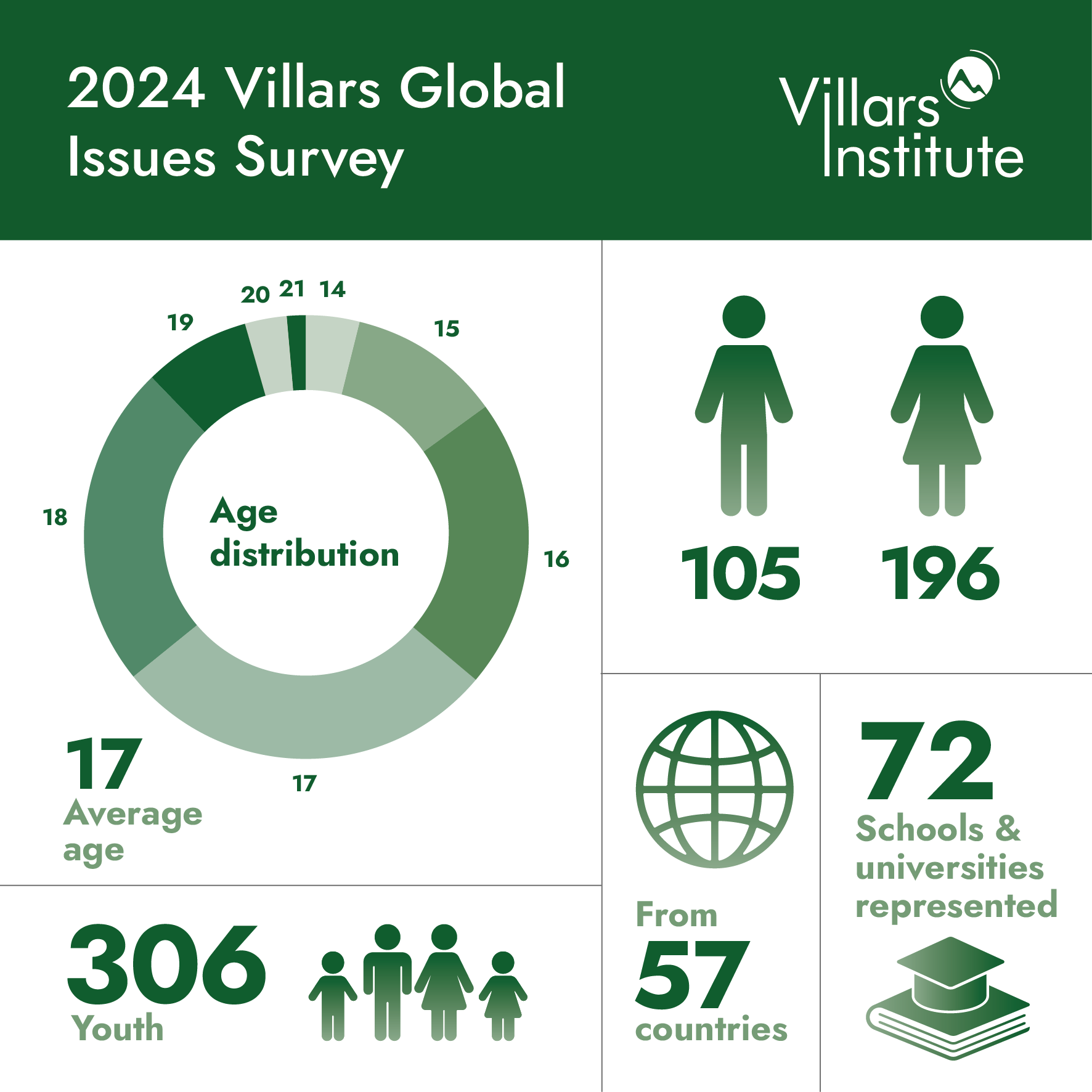The Villars Institute’s annual Global Issues Survey sets out to capture these opinions and bring them into focus, examining the perceptions of our growing community of young Villars Fellows about under-reported topics shaping their future and the future of our planet. Villars Fellows are aspiring individuals from around the world, ages 13 and above, driven by their passion for learning and creating lasting positive change.
The survey aims to challenge the dominant narrative that youth sentiment is that of anger and “eco-anxiety” and observe the shift in mentality towards “eco-ambition.” It also addresses a common gap in existing youth surveys about global issues, by seeking to understand how these issues will influence future education, career, and lifestyle choices.
Our hope is to provide valuable insights for educators and employers alike, to inform the future design of school core curricula and learning and development programs, while also gaining a better understanding of the needs and aspirations of the next generation of talent.
Valuable Insights
The 2024 Global Issues Survey asked 306 individuals between the ages 14 and 21, from 57 countries, for their perspective on six global issues: Systems Thinking and Systems Leadership, Planetary Boundaries, Net-Zero Carbon Emissions, Nature Positive, Energy Transition, and Emerging Technologies.
The survey explored how these global topics might shape the work, career and daily life of young people in the next five years. More than 60% of the young people involved believe that the issues raised in the survey will have high or very high influence on their everyday lives in the next five years. And 63% of those surveyed believe that the same issues will be very or extremely relevant to their careers in the same period.The 2024 Global Issues Survey reveals a high-priority education and learning gap between what youth know will be important for a sustainable future and what they need to know to make a meaningful difference. For example, 99% of the respondents believe Systems Thinking will have some level of relevance in achieving their education or career goals in the next five years, with 76% believing it will be either very or extremely relevant. However, just 63% of respondents felt their current capability was average or below average.
Similarly, this year’s survey found that 62% of respondents believe that Planetary Boundaries will have high or very high influence on their everyday behavior in the next five years, and all respondents felt that Planetary Boundaries will have some influence. However, this belief doesn’t align with the depth of understanding, with 46% of respondents only having average or below average understanding of the Planetary Boundaries.
The survey also asked an open-field question concerning which topic young people would be interested in learning more about over the next five years, in the context of finding practical ways to improve the health of the planet. Interestingly, the most common response was Emerging Technologies with 41% of respondents prioritizing it above the other five themes examined in this survey.
I am confident that my generation will have the technology, the passion and the unified movement to make a meaningful difference, but it is up to the current generation of leaders to make sure we have a platform from which we can still achieve a positive outcome.
Part of this platform for a positive outcome requires that our current generation of leaders accept responsibility for the education and development of today’s youth – the next generation of leaders – with a focus on the fields that will be most important to a sustainable future – Systems Thinking and Systems Leadership, Planetary Boundaries, Net-Zero Carbon Emissions, Nature Positive, Energy Transition, and Emerging Technologies.
We must do everything we can to amplify the voices of young people and educate and empower today’s youth to become leaders in issues that directly impact their future.
Click here to access the Global Issues Survey 2024.





